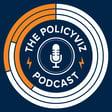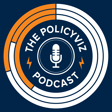
The Power of Data: The Black Wealth Data Center and Harsha Mallajosyula
In this episode of the PolicyViz Podcast, I have the pleasure of talking with Harsha Mallajosyula, Director of Data at the Black Wealth Data Center, about the center’s mission to provide accessible, high-quality data on racial wealth equity in the United States. Harsha shares insights into how the center aggregates and cleans data from public and private sources, making it easier for policymakers, researchers, and advocates to understand and address racial wealth disparities. He discusses the challenges of merging datasets with different racial classifications, the importance of data transparency, and the center’s shift toward more intuitive, mobile-friendly visualization tools. Harsha also highlights the future of the Black Wealth Data Center, including the use of AI and machine learning for data improvement, expanding user research, and developing new tools for deeper insights.
Keywords: data equity, racial wealth gap, Black Wealth Data Center, data accessibility, public policy, data visualization, data transparency, racial wealth equity, social impact, data science, policy analysis, economic disparities, AI in data, wealth accumulation, public-private partnerships
Subscribe to the PolicyViz Podcast wherever you get your podcasts.
Become a patron of the PolicyViz Podcast for as little as a buck a month
Check out the Black Wealth Data Center
Follow me on Instagram, LinkedIn, Substack, Twitter, Website, YouTube
Email: jon@policyviz.com


